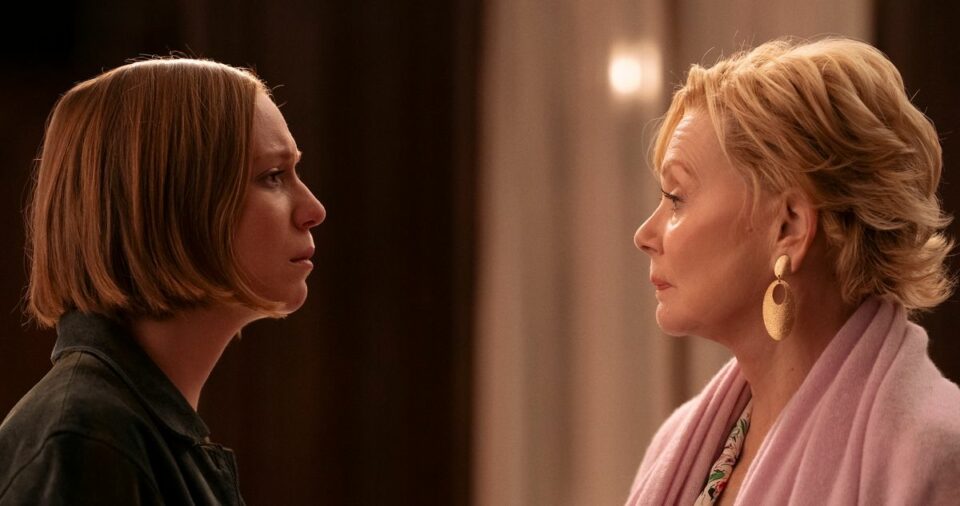[ad_1]

Three seasons in, Hacks, a showbiz comedy built around the relationship between a Joan Rivers–inspired stand-up and a young writer, is an Emmy fixture. It’s the subject of intense adulation — Thursday nights on the site formerly known as Twitter are filled with people losing their mind over the show’s peppy Hollywood satire. It’s often talked about in prestige-television terms. The Atlantic recently held it up as a show that “breaks the curse of ‘Mid TV.’” (Not that there’s anything wrong with Mid TV, of course.) This is rare territory for a comedy … or at least for a show everyone broadly understands to be a comedy.
I have never found Hacks particularly funny. Sure, this is a wobbly ground for critique. Comedy is subjective, after all; I may be pathologically humorless, and so forth. But the jokes never struck me as the show’s strength. Others seem to see the series working at the punch-line-per-minute density of 30 Rock, but to my eyes, the material is contiguous with conventional sitcoms like Everybody Loves Raymond: It’s broad, it’s fine, it’s interior decoration for the real purpose of a sitcom, which is to deliver the coziness that comes with wrapping yourself in a world you’ve grown to love. That sitcom nature manifests in the show’s conservative structure. Ultimately, Hacks always reverts to its status quo.
What has always drawn me to Hacks is the seriousness with which it takes the core relationship between Ava and Deborah. It’s a delightfully complicated dynamic. They are some mixture of mentor-mentee, surrogate mother–daughter, and two halves helping each other become whole, yet they occupy two poles of a deranged workplace arrangement: Deborah is Ava’s emotionally abusive employer, while Ava is Deborah’s Stockholm syndromed employee. Hacks is best when it draws out the dramatic opportunities of this pairing, but the third season illustrates the limits of what you can do when you’re a drama trapped in a sitcom’s body. Worse still, the show now seems so comfortable with itself that it no longer pushes its premise or central relationship in compelling ways.
It’s not that this season is devoid of highs in the Ava-Deborah dynamic, which mostly involves Deborah conscripting Ava’s writing assistance in her latest bid to host a late-night show. Consider the fifth episode, “One Day,” in which Deborah tries to lift Ava’s post-breakup spirits by accompanying her on a hike. They get lost in the woods, obviously, because you need a conflict to drive an episode, but there’s a sweetness to these beats, a clear instance of Deborah assuming a parental role for the unmoored Ava. Deborah comforts Ava by relating her own experience with the generosity of time, even as the older comedian reflects on how life is both longer than you think and shorter than you want it to be. “Anything I want to do, I have to do now or else I’ll never do it,” Deborah says. The moment finds its inverse in the climax of the season finale, “Bulletproof,” which features a visceral blowup between the two after Ava learns that Deborah has decided to give the head-writer position to a more established hand instead of risking it on Ava. For Ava, who sacrificed a romantic relationship and another head-writer gig for her mentor, this betrayal isn’t just a professional one. “I put you first because I care about you,” she says. “And I can’t believe you won’t do that for me.”
Here, the show raises its most potent questions: What does it mean if a person refuses to change? How do you process feeling so thoroughly betrayed by a mentor you’ve come to love? But Hacks has repeatedly displayed an unwillingness to commit to that potential, opting instead to snap back to some reformulated version of its initial setup. The punch of the season-two finale, which sees Deborah firing Ava as a way not to hold back Ava’s career, ultimately dims when Deborah rehires Ava as her creative partner at the beginning of season three. Pretty much the same thing happens at the end of “Bulletproof” when Ava returns to blackmail Deborah into giving her the head-writer gig. It’s an explosive ending on paper, but in execution, it feels too pat, too repetitive. The power dynamic between them has shifted, though only slightly. In many senses, we’re back to the beginning: a twisted workplace marriage and stifled pseudo-mother-daughter relationship. Once again, the dramatic potential of lingering with a betrayal is swapped out in favor of resetting to zero.
That reluctance to commit extends to Hacks’s handling of Deborah herself. The show takes her side in almost all things. She gets the more triumphant zingers. In contrast with Ava, the joke is never on her. This stance is starting to feel frustrating. In “Yes, And,” season three’s penultimate episode, Deborah visits her alma mater, Berkeley, where she’s targeted by student protesters after clips of her older, racist material resurface on TikTok. The hubbub risks jeopardizing Deborah’s campaign for the late-night job, and she falls back on a stance that’s common among comedians in similar situations. “You never apologize for a joke,” she tells Ava in defiance. Everyone else was telling those jokes in that era, she argues, and as a woman trying to survive in a sexist industry, she told them because she had to. True as that may be, Ava pushes back. Whatever Deborah’s reasons in the past, everybody else has the right to respond as they want in the present.
But before anything genuinely complex can play out, the situation resolves all too smoothly. The episode culminates in Deborah attending a listening session, where she sits through a succession of students expressing their hurt over her old material. The scene is short, and rather than linger on Deborah’s discomfort, the episode cuts right back to her at home, where she learns she’s getting the late-night gig after all. The entire sequence of events feels like whiplash. Deborah never grapples with her experiences at Berkeley. In fact, she never discusses how she feels about her history afterward. Everything comes a little too easy on Hacks, and in the end, Deborah gets what she wants: a host job, self-actualization, and the moral high ground. Nothing that happens to her seems to actually matter.
This tonal imbalance is reflected in other weaknesses this season. While Hacks has always centered on Deborah’s story, previous outings still found the space and balance to flesh out other characters with adequate focus. Not so this time. Marcus, the COO of Deborah’s business enterprise, is mostly sidelined this season, and his decision to leave her operation — in part a reflection of his realization that he will remain personally and professionally limited under Deborah’s employ — comes without much actual engagement with the older comedian herself. The reappearance of Deborah’s sister, Kathy, now played by J. Smith-Cameron (who replaces Linda Purl), feels underbaked despite the character being central to the trauma driving Deborah’s motivations. What Kathy represents to her sister, in both the past and the future, needs more room to breathe. Meanwhile, enormous swathes of the season are dedicated to the ongoing adventures of Jimmy and Kayla, Deborah’s agent and his assistant–business partner, which have always felt like they were happening on a completely different show: something in a similar ballpark as The Other Two but far less pointed and effective.
As a comedy, Hacks should probably be placed on the same shelf as Entourage and Ballers. Consider the luxurious setting, the materially low showbiz stakes, the ease with which its characters move through the world. Except that Hacks is clearly interested in being more serious than that, with constant gesturing toward bigger ideas about the nature of comedy, show business, “Middle America,” queer fandom, aging, and cross-generational bonds, as well as director of photography Adam Bricker’s visual compositions, which favor a melancholic pallor that droops over the smooth, glitzy glamour onscreen. The show loves taking short beats to contrast Deborah’s dazzling life with the reality of aging. She appears regularly without her wig, and the scene of her getting a physical at the top of “Yes, And” gets at her sense of defiant dignity in the face of natural decline. Her loneliness at the top is Hacks’s defining image and, ultimately, its most pressing concern. Here is where Jean Smart’s luminous performance cuts both ways. It is simultaneously the show’s best weapon and its strongest shield distracting from its flaws.
Hacks’s comedy has become a crutch that undermines its ability to follow through on its best dramatic possibilities. So much about the show warrants acclaim, from the Ava-Deborah relationship to its character study of an older female stand-up overcoming decades of disadvantage while reckoning with her sins on the way up. Now that Max has ordered a fourth season, maybe Hacks will stop circling in place and finally see its emotional potential through to the end.
Related
- Hacks Season-Finale Recap: How to Succeed in Business
[ad_2]
Nicholas Quah , 2024-06-06 14:00:42
Source link



